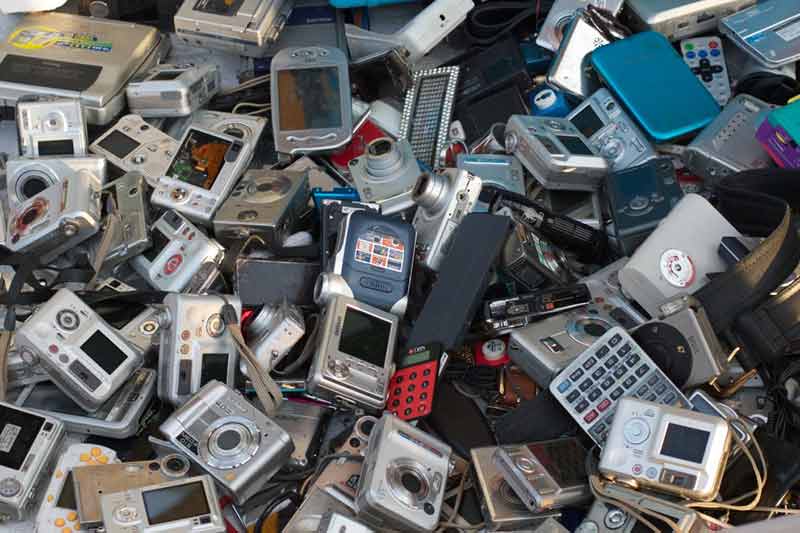
On 6 March 2018, at the Ministry of Environment and Water
Resources (MEWR) Committee of Supply (COS) 2018 debate in the Singapore
Parliament, Dr Amy Khor, Senior Minister of State for the Environment and Water
Resources, said
that a mandatory e-waste management system will be implemented in Singapore by
2021.
A recent
study by the National Environment Agency (NEA) found that around 11 kg of
electrical and electronic waste (e-waste), equal in weight to 73 mobile phones,
is disposed of per person in Singapore, amounting to more than 60,000 tonnes of
e-waste annually. Currently residents place only around 6% of their e-waste in
e-recycling bins. Though the recycling rate for businesses might be higher due
to take-back arrangements between businesses, and manufacturers or importers,
Dr Khor said much more needs to be done.
E-waste contains heavy metals and hazardous substances that
can seriously harm the environment and public health if not properly handled.
Some heavy metals can also be extracted from properly recovered e-waste and
re-used, which is more sustainable than mining for virgin materials.
To deal with e-waste management MEWR will implement a
mandatory e-waste management system by 2021. The system will ensure that
electrical and electronic products are disposed of in an environmentally
friendly way and allow for safe recovery of useful resources.
For a start, this system will cover 5 main categories of
products, namely ICT equipment like mobile phones and computers, solar panels,
batteries, lamps, and certain large household appliances like refrigerators,
air-conditioners, washing machines and dryers. Together, these products constitute
around 90% of e-waste in Singapore and pose more harm to the environment if not
properly treated.
Singapore’s e-waste management
system will adopt the Extended Producer Responsibility (EPR) approach, which is also implemented in
other countries like Sweden and South Korea. Under EPR regimes, producers
are given a significant responsibility for the treatment or disposal of
post-consumer products. This could provide incentives to the producers to
prevent wastes at the source, promote product design for the environment and
support the achievement of public recycling and materials management goals
NEA will set collection targets for manufacturers and
importers to take back a proportion of the products they put on the market. They
will be required to work with NEA-licensed Producer Responsibility
Organisations (PROs), which will organise the collection, transport and proper
treatment of e-waste, and help the manufacturers and importers achieve their
targets.
For example, PROs will work with large electrical and
electronic retailers to set up in-store e-waste collection points. All
retailers must also provide free one-for-one take-back service for their
products.
Apart from the take-back service provided by retailers, Town
Councils also provide bulky waste disposal services, which will ensure
collected e-waste is properly recycled.
Collection targets will be set in consultation with the
industry and reviewed before eventual implementation of a penalty framework.
Dr Khor mentioned that the European Union (EU) started with
an overall collection target of 4 kg per capita in 2003. After 13 years, the
target reached 45% of all electronic products sold on market by weight.
MEWR will study the practices in other countries to design a
cost-effective system. Aggregation of e-waste and more efficient collection and
processing is expected to capture greater value from e-waste, helping offset the
cost of operating the e-waste system. Relevant stakeholders will be consulted
to work out legislation and implementation details.
“The mandatory e-waste system will help both the environment
and the economy. EPR systems have generated new business opportunities and jobs
in the e-waste management and recycling industries in other countries. In
France, more than 3,000 e-waste recycling jobs were created since EPR was
implemented in 2005. We will integrate and support smaller industry players so
they can benefit from our national system, including karang guni men who
provide collection services,” said Dr Khor.
She also highlighted initiatives taken by some companies to
implement voluntary e-waste management programmes. An example is StarHub’s RENEW
programme, run in partnership with DHL and TES-AMM. Retailers like Courts, Gain
City and Harvey Norman are coming on board the RENEW programme and there will
be e-waste collection bins in some of their outlets soon.
The NEA website provides a current
list of e-Waste Recycling Programmes for individuals / households , as well
as businesses.
















